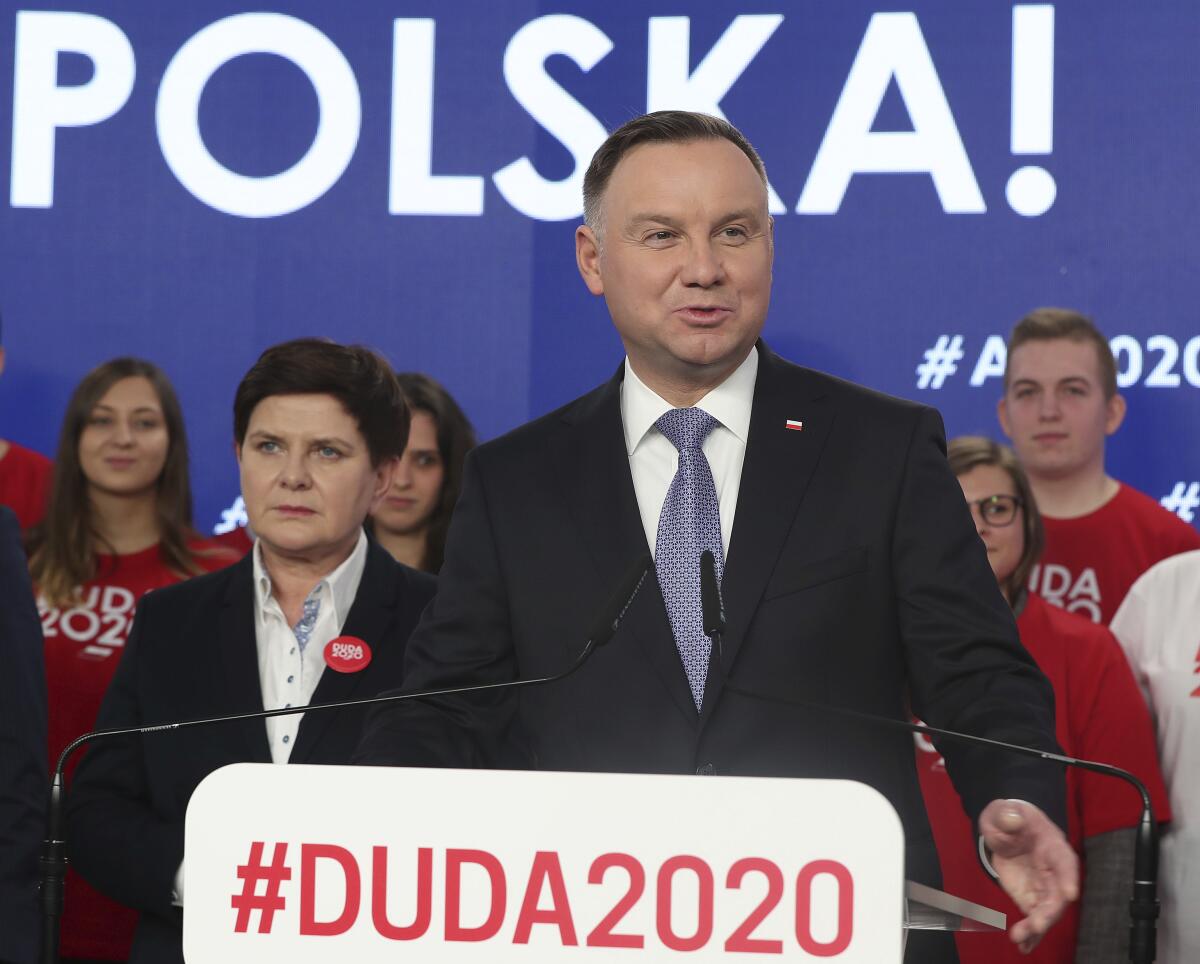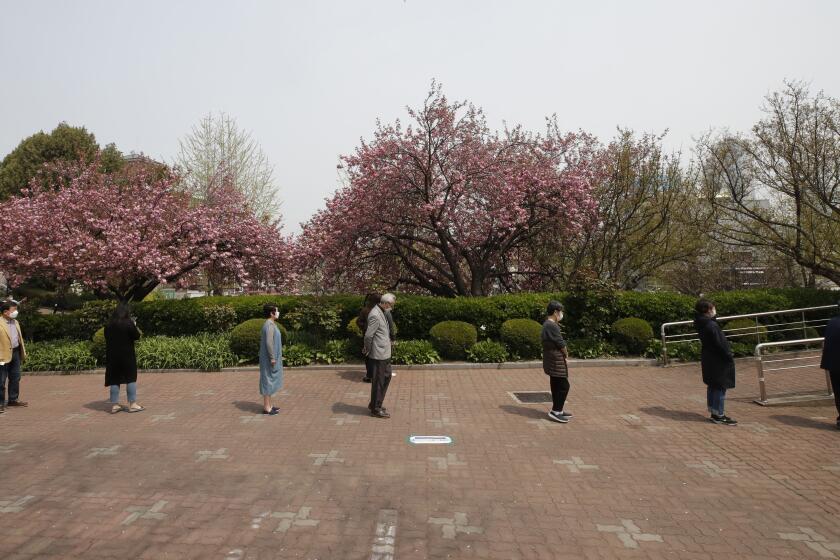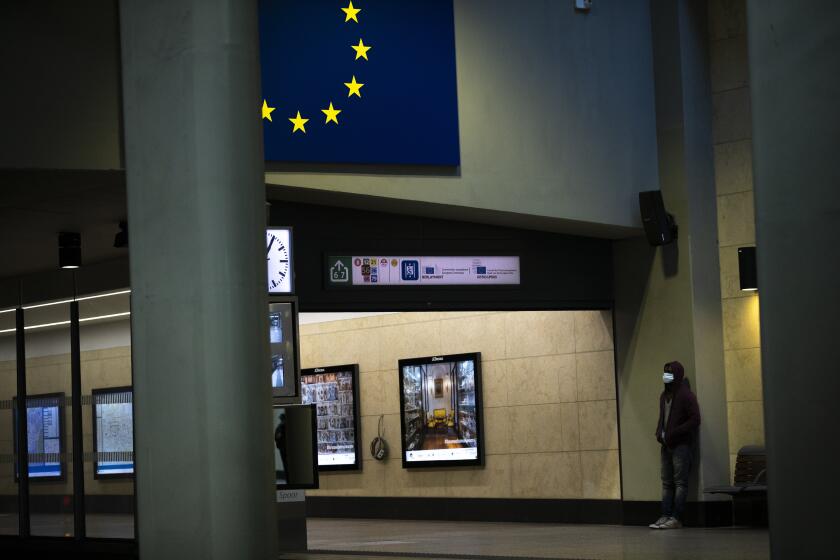Poland is supposed to have a presidential election in 4 days — but nobody knows if it’ll happen

- Share via
WARSAW — Poland is scheduled to hold a presidential election in just four days, but nobody can say whether it will happen or not.
Sunday’s election date was set months ago, but preparations have been thrown into disarray by the COVID-19 pandemic and the lockdown Poland is under to contain the spread of the coronavirus. Bitter fighting between the ruling conservative party and its opponents is preventing the two sides from coming together to find an alternative.
Plans for the vote are in chaos. Proposed legislation regulating it is still in Parliament, with no guarantee that it will pass. A government official in charge of the vote acknowledges that the election cannot be pulled off Sunday — but it has not been officially postponed, either.
The ruling party Wednesday was setting the stage for a two-week postponement of the election with the permission of the country’s top court.
South Korea’s record turnout for its parliamentary election, despite the coronavirus, offers a blueprint for other countries.
Up to now, the ruling Law and Justice party has been pushing to stick to schedule — a vote Sunday and then a runoff May 24 if necessary — by making it a postal vote. Party leader Jaroslaw Kaczynski insists that the constitution requires the vote be held in May. But he also acknowledges that the party fears its candidate, President Andrzej Duda, the front-runner in opinion polls, could be weakened later when the economic pain of the coronavirus lockdown hits the now-robust Polish economy.
Opposition parties are against holding the vote now and want the government to declare a state of emergency to create a legal way to postpone the vote by three months. They note that, under the lockdown, their candidates have not been able to campaign in any normal fashion but that Duda is constantly on state television amid the government’s virus-fighting efforts.
All of Poland’s living ex-presidents and several former prime ministers plan to boycott what they called a “pseudo-election.”
Donald Tusk, former Polish prime minister and former top European Union leader, likened the political situation to autocratic Belarus. He said Tuesday on Twitter that there used to be a joke in Belarus that “you never knew if or when elections will take place, but you always knew who will win.”
International democracy watchdogs have also voiced concerns, including the Organization for Security and Cooperation in Europe.
“For democratic elections, it’s crucial that there is an open debate and genuine campaigning,” said Katya Andrusz, spokeswoman for the OSCE’s Warsaw-based Office for Democratic Institutions and Human Rights.
The European Union is predicting a drop in economic output of more than 7% this year because of the impact of the coronavirus.
Many Poles say they plan to boycott a vote they don’t trust will be anonymous or fair. Under the current plan, 30 million registered voters would receive ballots in their home mailboxes and then drop them Sunday in voting boxes set up in their neighborhoods.
Reports of ballots having been posted online or even lying in the street have only added to the general distrust in the mail-in vote.
Weeks ago, Law and Justice proposed holding the election exclusively by mail, regarding that as a safe option during the pandemic. But that required new legislation to regulate such an election.
The law passed the lower house of Parliament in early April, but was rejected Tuesday by the opposition-controlled Senate. Now, the legislation returns to the lower house for a final vote, possibly on Wednesday. The outcome of the vote is not certain.
In Poland, where the conservative Catholic Church has a deep hold, an atheist, Robert Biedron, is the first gay man in history to run for president.
A government official in charge of organizing the postal vote, Jacek Sasin, said Monday that the schedule leaves too little time for 30 million ballots to be delivered by Sunday.
Illustrating the chaos, Parliament Speaker Elzbieta Witek, the official in charge of naming election dates, is seeking the constitutional court’s consent for a postponement till May 23, but also asked the State Electoral Commission if it could organize the presidential vote on Sunday.
The commission head, Sylwester Marciniak, replied Tuesday night that it was “impossible for legal and organizational reasons,” the PAP news agency said.
Complicating matters further, one small party in the conservative governing coalition is divided on the issue, with some of its members favoring a postponement. That creates the risk that the ruling party could lose its slim parliamentary majority.
Analysts see an advantage in postponing the election to May 17 or May 23, which would be the latest date possible under a constitutionally dictated schedule based on Duda’s five-year term expiring on Aug. 6.
There’s been speculation that if Law and Justice loses its parliamentary majority, it could declare a state of emergency, dissolve the government and trigger new parliamentary and presidential elections for August.
But Law and Justice lawmaker and spokesman Radoslaw Fogiel insists that under the extraordinary circumstances of the pandemic, the party is trying to “solve the problems rather than look for them.”
More to Read
Sign up for Essential California
The most important California stories and recommendations in your inbox every morning.
You may occasionally receive promotional content from the Los Angeles Times.













